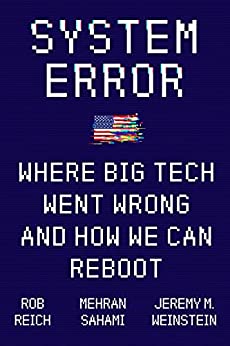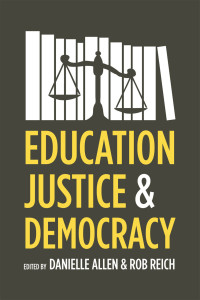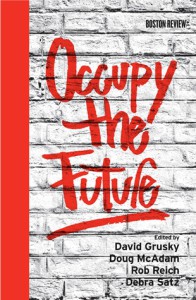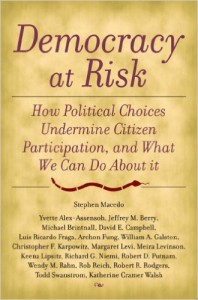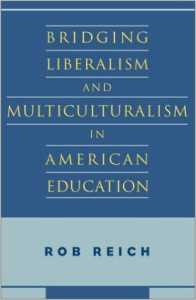Publications
Books
2021 System Error: Where Big Tech Went Wrong and How We Can Reboot, HarperCollins Publishers.
In no more than the blink of an eye, a naïve optimism about technology’s liberating potential has given way to a dystopian obsession with biased algorithms, surveillance capitalism, and job-displacing robots. Yet too few of us see any alternative to accepting the onward march of technology. We have simply accepted a technological future designed for us by technologists, the venture capitalists who fund them, and the politicians who give them free rein.
It doesn’t need to be this way.
System Error exposes the root of our current predicament: how big tech’s relentless focus on optimization is driving a future that reinforces discrimination, erodes privacy, displaces workers, and pollutes the information we get. This optimization mindset substitutes what companies care about for the values that we as a democratic society might choose to prioritize. Well-intentioned optimizers fail to measure all that is meaningful and, when their creative disruptions achieve great scale, they impose their values upon the rest of us.
Armed with an understanding of how technologists think and exercise their power, three Stanford professors—a philosopher working at the intersection of tech and ethics, a political scientist who served under Obama, and the director of the undergraduate Computer Science program at Stanford (also an early Google engineer)—reveal how we can hold that power to account.
Troubled by the values that permeate the university’s student body and its culture, they worked together to chart a new path forward, creating a popular course to transform how tomorrow’s technologists approach their profession. Now, as the dominance of big tech becomes an explosive societal conundrum, they share their provocative insights and concrete solutions to help everyone understand what is happening, what is at stake, and what we can do to control technology instead of letting it control us.
2021 Digital Technology and Democratic Theory, University of Chicago Press.
One of the most far-reaching transformations in our era is the wave of digital technologies rolling over—and upending—nearly every aspect of life. Work and leisure, family and friendship, community and citizenship have all been modified by now-ubiquitous digital tools and platforms. Digital Technology and Democratic Theory looks closely at one significant facet of our rapidly evolving digital lives: how technology is radically changing our lives as citizens and participants in democratic governments.
To understand these transformations, this book brings together contributions by scholars from multiple disciplines to wrestle with the question of how digital technologies shape, reshape, and affect fundamental questions about democracy and democratic theory. As expectations have whiplashed—from Twitter optimism in the wake of the Arab Spring to Facebook pessimism in the wake of the 2016 US election—the time is ripe for a more sober and long-term assessment. How should we take stock of digital technologies and their promise and peril for reshaping democratic societies and institutions? To answer, this volume broaches the most pressing technological changes and issues facing democracy as a philosophy and an institution.
2018 Just Giving: Why Philanthropy Is Failing Democracy and How It Can Do Better, Princeton University Press.
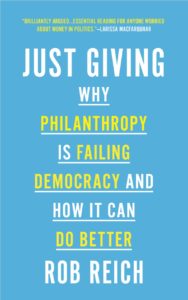
Is philanthropy, by its very nature, a threat to today’s democracy? Though we may laud wealthy individuals who give away their money for society’s benefit, Just Giving shows how such generosity not only isn’t the unassailable good we think it to be but might also undermine democratic values and set back aspirations of justice. Big philanthropy is often an exercise of power, the conversion of private assets into public influence. And it is a form of power that is largely unaccountable, often perpetual, and lavishly tax-advantaged. The affluent—and their foundations—reap vast benefits even as they influence policy without accountability. And small philanthropy, or ordinary charitable giving, can be problematic as well. Charity, it turns out, does surprisingly little to provide for those in need and sometimes worsens inequality.
These outcomes are shaped by the policies that define and structure philanthropy. When, how much, and to whom people give is influenced by laws governing everything from the creation of foundations and nonprofits to generous tax exemptions for donations of money and property. Rob Reich asks: What attitude and what policies should democracies have concerning individuals who give money away for public purposes? Philanthropy currently fails democracy in many ways, but Reich argues that it can be redeemed. Differentiating between individual philanthropy and private foundations, the aims of mass giving should be the decentralization of power in the production of public goods, such as the arts, education, and science. For foundations, the goal should be what Reich terms “discovery,” or long-time-horizon innovations that enhance democratic experimentalism. Philanthropy, when properly structured, can play a crucial role in supporting a strong liberal democracy.
Just Giving investigates the ethical and political dimensions of philanthropy and considers how giving might better support democratic values and promote justice.
2016 Philanthropy in Democratic Societies, University of Chicago Press.
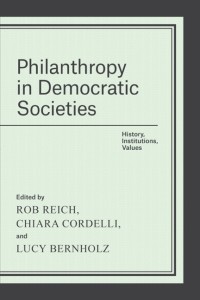
Growing out of an 18-month long seminar hosted at Stanford, this co-edited volume (with Lucy Bernholz and Chiara Cordelli) gathers scholars from philosophy, political science, law, sociology, and history and produces a multi-disciplinary inquiry about the role of philanthropy in democracy. I am co-author of the introductory chapter and single author of a chapter in the volume. Contributors: Jonathan Levy, Olivier Zunz, Lucy Bernholz, Aaron Horvath, Walter Powell, Paul Brest, Ray Madoff, Rob Reich, Eric Beerbohm, Ryan Pevnick, and Chiara Cordelli.
Philanthropy is everywhere. In 2013, in the United States alone, some $330 billion was recorded in giving, from large donations by the wealthy all the way down to informal giving circles. We tend to think of philanthropy as unequivocally good, but as the contributors to this book show, philanthropy is also an exercise of power. And like all forms of power, especially in a democratic society, it deserves scrutiny. Yet it rarely has been given serious attention. This book fills that gap, bringing together expert philosophers, sociologists, political scientists, historians, and legal scholars to ask fundamental and pressing questions about philanthropy’s role in democratic societies.
2013 Education, Justice, and Democracy, University of Chicago Press.
Co-edited volume (with Danielle Allen) focusing on intersections between normative and empirical approaches to the study of and purpose of education. I am co-author of the introductory chapter and single author of a chapter in the volume. Contributors: Helen Ladd, Susanna Loeb, Rob Reich, Anthony Laden, Sigal Ben-Porath, Angel Harris, Marcelo Suarez-Orozco and Carola Suarez-Orozco, Gregory Walton, Richard Rothstein, Harry Brighouse and Adam Swift, Patrick McGuinn, Anna Maria Smith, and Seth Moglen.
The book was awarded the 2013 PROSE Award for the best book in education. The PROSE Awards annually recognize the very best in professional and scholarly publishing by bringing attention to distinguished books, journals, and electronic content in over 40 categories. Judged by peer publishers, librarians, and medical professionals since 1976, the PROSE Awards are extraordinary for their breadth and depth
2013 Occupy the Future, MIT Press/Boston Review.
The Occupy Wall Street movement has ignited new questions about the relationship between democracy and equality in the United States. Are we also entering a moment in history in which the disjuncture between our principles and our institutions is cast into especially sharp relief? Do new developments—most notably the rise of extreme inequality—offer new threats to the realization of our most cherished principles? Can we build an open, democratic, and successful movement to realize our ideals? Occupy the Future offers informed and opinionated essays that address these questions. The writers—including Nobel Laureate in Economics Kenneth Arrow and bestselling authors Paul and Anne Ehrlich—lay out what our country’s principles are, whether we’re living up to them, and what can be done to bring our institutions into better alignment with them.
Co-edited volume (with David Grusky, Doug McAdam, and Debra Satz) produced in the wake of the Occupy movement that examines the consequences of severe inequality for democracy and identifies reforms that could bring democratic institutions in closer alignment with democratic ideals. I co-wrote the introduction and chapter on Ethics and Inequality. Contributors: Kenneth Arrow, David Grusky and Erin Cumberworth, Rob Reich and Debra Satz, Kim Weeden, Sean Reardon, Prudence Carter, Shelley Correll, Gary Segura, David Laitin, Cristobal Young and Charles Varner, Doug McAdam, Paul Ehrlich and Anne Ehrlich, Donald Barr, Michele Elam and Jennifer DeVere Brody, H. Samy Alim, and David Palumbo-Liu.
2009 Toward a Humanist Justice: The Political Philosophy of Susan Moller Okin, Oxford University Press.
The late Susan Moller Okin was a leading political theorist whose scholarship integrated political philosophy and issues of gender, the family, and culture. Okin argued that liberalism, properly understood as a theory opposed to social hierarchies and supportive of individual freedom and
equality, provided the tools for criticizing the substantial and systematic inequalities between men and women. Her thought was deeply informed by a feminist view that theories of justice must apply equally to women as men, and she was deeply engaged in showing how many past and present political
theories failed to do this. She sought to rehabilitate political theories–particularly that of liberal egalitarianism, in such a way as to accommodate the equality of the sexes, and with an eye toward improving the condition of women and families in a world of massive gender inequalities. In her
lifetime Okin was widely respected as a scholar whose engagement went well beyond the world of theory, and her premature death in 2004 was considered by many a major blow to progressive political thought and women’s interests around the world.
Co-edited (with Debra Satz) volume of essays on the work of Susan Moller Okin. I am co-author of the introductory chapter on Okin’s work and the nature of the volume. Contributors: Nancy Rosenblum, Joshua Cohen, Elizabeth Wingrove, John Tomasi, David Miller, Molly Lynn Shanley, Cass Sunstein, Ayelet Shachar, Allison Jaggar, Chandran Kukathas, Robert Keohane, and Iris Marion Young.
2005 Democracy at Risk: How Political Choices Undermine Citizen Participation, and What We Can Do About It, Brookings Institution Press.
Voter turnout was unusually high in the 2004 U.S. presidential election. At first glance, that level of participation—largely spurred by war in Iraq and a burgeoning culture war at home—might look like vindication of democracy. If the recent past is any indication, however, too many Americans will soon return to apathy and inactivity. Clearly, all is not well in our civic life. Citizens are participating in public affairs too infrequently, too unequally, and in too few venues to develop and sustain a robust democracy. This important new book explores the problem of America’s decreasing involvement in its own affairs. Democracy at Risk reveals the dangers of civic disengagement for the future of representative democracy. The authors, all eminent scholars, undertake three main tasks: documenting recent trends in civic engagement, exploring the influence that the design of political institutions and public policies have had on those trends, and recommending steps that will increase the amount and quality of civic engagement in America. The authors focus their attention on three key areas: the electoral process, including elections and the way people get involved; the impact of location, including demographic shifts and changing development patterns; and the critical role of nonprofit organizations and voluntary associations, including the philanthropy that help keep them going.
This important project, initially sponsored by the American Political Science Association, tests the proposition that social science has useful insights on the state of our democratic life. Most importantly, it charts a course for reinvigorating civic participation in the world’s oldest democracy.
Authors: Stephen Macedo, Yvette Alex-Assensoh, Jeffrey M. Berry, Michael Brintnall, David E. Campbell, Luis Ricardo Fraga, William A. Galston, Christopher F. Karpowitz, Margaret Levi, Meira Levinson, Keena Lipsitz, Richard G. Niemi, Robert D. Putnam, Wendy M. Rahn, Rob Reich, Robert R. Rodgers, Todd Swanstrom, and Katherine Cramer Walsh
Final report of the Standing Committee on Civic Education and Engagement of the American Political Science Association, of which I was a member between 2002 and 2005. I contributed substantially to chapter 1, “Toward a Political Science of Citizenship” and chapter 4, “Associational Life and the Nonprofit and Philanthropic Sector.”
2002 Bridging Liberalism and Multiculturalism in Education, University of Chicago Press.
What should the civic purposes of education be in a liberal and diverse society? Is there a tension between cultivating citizenship and respecting social diversity? What are the boundaries of parental and state authority over education?
Linking political theory with educational history and policy, Rob Reich offers provocative new answers to these questions. He develops a liberal theory of multicultural education in which the leading goal is the cultivation of individual autonomy in children. Reich draws out the policy implications of his theory through one of the first sustained considerations of homeschooling in American education. He also evaluates three of the most prominent trends in contemporary school reform—vouchers, charter schools, and the small school movement—and provides pedagogical recommendations that sharply challenge the reigning wisdom of many multicultural educators.
Written in clear and accessible language, this book will be of interest to political theorists, philosophers, educators, educational policymakers, and teachers.
Reviewed in New York Times, Perspectives on Politics, Ethics, Political Theory, Philosophy in Review, Theory and Research in Education, Journal of Philosophy of Education, Contemporary Sociology, Educational Policy, and Times Educational Supplement.
Peer-Reviewed Articles (unless otherwise noted)
2020 “Against Perpetuity,” in Giving in Time, Benjamin Soskis and Ray Madoff, eds., forthcoming Rowman & Littlefield.
2020 “Teaching Computer Ethics: A Deeply Multidisciplinary Approach,” with Mehran Sahami, Jeremy M. Weinstein, and Hilary Cohen, in Proceedings of the 51st ACM Technical Symposium on Computer Science Education (SIGCSE’20). March 11–14, 2020, Portland, OR, USA. ACM, New York, NY, USA. https://doi.org/10.1145/3328778.3366951
2020 “Philanthropy and the All Affected Principle,” with Emma Saunders-Hastings, in a collection of papers on the all affected principle, edited by Archon Fung, Sean Gray, and Tomer Perry, under review.
2020 “Political Theory and the Nonprofit Sector,” with Theodore Lechterman, in The Nonprofit Sector: A Research Handbook, Walter Powell and Patricia Bromley, eds., Stanford University Press.
2019 “Equality and Adequacy as Distributive Ideals for Education,” with Debra Satz, in Philosophical Perspectives on Moral and Civic Education: Shaping Citizens, Christine Tappolet and Colin MacLeod, eds., Routledge.
2017 “Trust, Transparency, and Replication in Political Science,” with David Laitin,PS: Political Science and Politics.
2016 “Repugnant to the Whole Idea of Democracy? On the Role of Foundations in Democratic Societies,” PS: Political Science and Politics, Vol. 49, July 2016. doi:10.1017/S1049096516000718
2016 “Philanthropy in Democratic Societies,” with Lucy Bernholz and Chiara Cordelli, in Philanthropy in Democratic Societies, Reich, Bernholz, Cordelli, eds., University of Chicago Press.
2016 “On the Role of Foundations in Democratic Societies,” in Philanthropy in Democratic Societies, Reich, Bernholz, Cordelli, eds., University of Chicago Press.
2016 “Philanthropy and Intergenerational Justice,” co-author with Chiara Cordelli, in Institutions for Future Generations, Axel Gosseries and Iñigo González, eds., Oxford University Press.
2014 “Gift Giving and Philanthropy in Market Democracy,” in Critical Review, Vol. 26, Nos. 3-4.
2014 “Can Charitable Compensation Diminish Complicity?” in Yale Human Rights & Development Law Journal, Vol. 17: 113-119. [not peer-reviewed]
2013 “Philanthropy and Caring For the Needs of Strangers,” in Social Research, Vol. 80, No. 2: 517-538.
2013 “Equality, Adequacy, and K-12 Education,” in Education, Justice, and Democracy, Danielle Allen and Rob Reich, eds., University of Chicago Press.
2013 “Education, Justice, and Democracy,” with Danielle Allen, in Education, Justice, and Democracy, Danielle Allen and Rob Reich, eds., University of Chicago Press: 1-15.
2011 “The Great Recession, Philanthropy, and the Nonprofit Sector: Has the Great Recession Made Americans Stingier?” with Christopher Wimer, Shazad Mohamed, and Sharada Jambulapati, in The Great Recession, David Grusky and Christopher Wimer, eds., Russell Sage.
2011 “Toward a Political Theory of Philanthropy,” Giving Well: The Ethics of Philanthropy, Patricia Illingworth, Thomas Pogge, Leif Wenar, eds., Oxford University Press.
2009 “Educational Authority and Children’s Rights,” chapter for the Oxford Handbook of Philosophy of Education, Harvey Siegel, ed. Oxford University Press. [not peer-reviewed]
2009 “Toward a Humanist Justice: A Critical Introduction to the Work of Susan Moller Okin,” with Debra Satz, in Toward a Humanist Justice, Debra Satz and Rob Reich, eds., Oxford University Press, 2009: 3-12.
2008 “On Regulating Homeschooling: A Reply to Glanzer,” Educational Theory, Vol. 58 (1): 17-23.
2008 “Common Schooling and Educational Choice as a Response to Pluralism,” lead essay in School Choice Policies and Outcomes: Philosophical and Empirical Perspectives on Limits to Choice in Liberal Democracies, Walter Feinberg and Christopher Lubienski, eds. (Albany, NY: SUNY Press).
2008 Reprinted in The Common School and The Comprehensive Ideal, Mark Halstead and Graham Haydon, eds., (Oxford: Wiley-Blackwell): 207-223.
2007 “How and Why to Support Common Schooling and Educational Choice at the Same Time,” Journal of Philosophy of Education Vol. 41 (4): 709-725.
2007 “When Adequate Isn’t: The Retreat From Equity in Educational Law and Policy and Why it Matters”, with William S. Koski. Emory Law Review, Vol. 56, No. 3.
2006 “Philanthropy and its Uneasy Relation to Equality,” in Taking Philanthropy Seriously: Beyond Noble Intentions to Responsible Giving, William Damon and Susan Verducci, eds. (Bloomington, IN: Indiana University Press): 33-49.
2005 “A Failure of Philanthropy: American Charity Shortchanges the Poor, and Public Policy is Partly to Blame,” Stanford Social Innovation Review, Winter 2005: 24-33. [not peer-reviewed]
2005 “Minors Within Minorities: A Problem for Liberal Multiculturalists”, in Minorities Within Minorities: Equality, Rights, and Diversity, Jeff Spinner-Halev and Avigail Eisenberg, eds., Cambridge University Press: 209-26.
2005 “Why Homeschooling Should Be Regulated,” in Homeschooling in Full View: A Reader, Bruce S. Cooper, ed. (Greenwich, CT: Information Age Publishing): 109-120. [not peer-reviewed]
2003 “A Liberal Democratic Approach to Language Justice,” co-author with David Laitin, in Political Theory and Language Justice, Will Kymlicka and Alan Patten, eds., Oxford University Press: 80-104.
2003 “Multicultural Accommodations in Education,” in Education and Citizenship in Liberal-Democratic Societies: Teaching for Cosmopolitan Values and Collective Identities, Walter Feinberg and Kevin McDonough, eds., Oxford University Press: 299-324.
2002 “Testing the Boundaries of Parental Authority Over Education: The Case of Homeschooling,” Political and Moral Education, NOMOS XLIII, Stephen Macedo and Yael Tamir, eds., New York: New York University Press: 275-313.
2002 “Opting Out of Education: Yoder, Mozert, and the Autonomy of Children,” Educational Theory, Vol. 52, No. 4, Fall: 445-61.
2002 “The Civic Perils of Homeschooling,” Educational Leadership, April 2002: 56-9. (Translated into Georgian, and appearing in the Georgian Journal of American Studies, 2005).
1999 “Families and Schools as Compensating Agents in Moral Development for a Multicultural Society,” with Susan Moller Okin, The Journal of Moral Education, Vol. 28, No. 3: 283-98.
1998 “Confusion About the Socratic Method: Socratic Paradoxes and Contemporary Invocations of Socrates,” in Philosophy of Education: Philosophy of Education Society, Urbana, IL.
1996 “The Paradoxes of Education in Rorty’s Liberal Utopia,” in Philosophy of Education: Philosophy of Education Society, Urbana, IL.
1989 “Re-Examining the Team A – Team B Exercise,” The International Journal of Intelligence and Counterintelligence, Vol. 3, No. 3: 387-403.
Review Essays
2014 Review essay on Ruth Grant’s Strings Attached: Untangling the Ethics of Incentives (Princeton: Princeton University Press, 2012), Perspectives on Politics, Vol. 12 (1): 223-4.
2012 Review essay on Michael Sandel’s What Money Can’t Buy: The Moral Limit of Markets (Farrar, Straus, Giroux, 2012), Stanford Social Innovation Review, Fall: 12-13.
2007 Review essay on Sigal Ben-Porath’s Citizenship Under Fire (Princeton: Princeton University Press, 2006), Journal of Philosophy of Education, Vol. 41 (1).
2007 Review essay on Amy Gutmann’s Identity in Democracy (Princeton: Princeton University Press, 2003), Theory and Research in Education, Vol. 5 (2): 241-51.
2006 Frederick Hess’s With the Best of Intentions: How Philanthropy is Reshaping K-12 Education (Cambridge: Harvard Education Press, 2005) in Teachers College Record.
2000 Stephen Macedo’s Diversity and Distrust: Civic Education in a Multicultural Democracy (Cambridge: Harvard University Press, 1999) in Philosophy in Review Vol. 20 (6) (December): 430-1.
Miscellany
2016 “Civil Society,” with Brian Coyne, an entry in American Governance, 5 Vols., Stephen Schechter, ed., Cengage Learning.
2014 “Liberalism,” an entry in the Sage Encyclopedia of Educational Theory and Philosophy, Denis Phillips ed., Sage Publications, 2014: 479-484.
2013 “Not Very Giving,” New York Times op-ed, Sept. 4.
2013 Four White Papers on Philanthropy, Technology, and Policy.
- The Emergence of Digital Civil Society (with Lucy Bernholz and Chiara Cordelli), 2013
- Shifting Ground Beneath Us: Framing Nonprofit Policy for the 21st Century (with Lucy Bernholz and Chiara Cordelli), 2013
- Good Fences: The Importance of Institutional Boundaries in the New Social Economy (with Lucy Bernholz and Chiara Cordelli), 2013
- Social Policy Forecast 2013 (with Lucy Bernholz)
For more, see digitalcivilsociety.stanford.edu
2013 “Much Ado About MOOCs” part of an online forum (with William Bowen, Michael Gecan, and Thomas Leddy) on online learning in Boston Review, June.
2013 “What are Foundations For?”, cover article in Boston Review March/April. With responses by Diane Ravitch, Paul Brest, Tyler Cowen, Pablo Eisenberg, Eric Beerbohm, Gara LaMarche, Stanley Katz, Deborah Fung, Rick Cohen, Seana Valentine Shiffrin, Larry Kramer, Robert Ross, Emma Saunders-Hastings, Christopher Coyne.
Translated into Portuguese, with responses: http://formadevida.org/rreichfdv4
2012 Study of Undergraduate Education at Stanford University. (Co-Author of report, and member of committee tasked with revising undergraduate education.)
2011 “Ethics and Inequality” with Debra Satz, online at Boston Review, Dec.
2011 Report of the National Commission on Civic Investment in Public Education, participant and co-author of final report, released by the Public Education Network, 2011.
2008 “Introduction to the Symposium on Equality and Adequacy,” a special issue of the journal Education, Finance and Policy, Vol. 3 (4). Contains articles by Helen Ladd, Debra Satz, Harry Brighouse and Adam Swift, and Kenneth Strike.
2007 “Equality and Adequacy in the State’s Provision of Education: Mapping the Conceptual Landscape”, a report prepared for Getting Down to Facts, a research project released in March 2007 consisting of more than 20 studies designed to provide California’s citizens with comprehensive information about the status of the state’s school finance and governance systems.
For more information, see: http://irepp.stanford.edu/projects/cafinance.htm
2006 “Philanthropy and Its Uneasy Relation to Equality,” Philosophy and Public Policy Quarterly, Vol. 26 (3/4), published by the Institute for Philosophy and Public Policy at the University of Maryland.
2006 “Editor’s Introduction” for a special issue of Theory and Research in Education on the work of Susan Moller Okin, Vol. 4, No. 1: 7-8. [I was guest editor for this issue.]
2005 “Service Learning and Multiple Models of Engaged Citizenship”, Boston University Journal of Education, Vol. 186 (1): 23-28.
2004 “Hope House Scholars: The Universal Reach of the Liberal Arts” an essay with Debra Satz, Dissent, Winter: 72-5.
2004 “A Brief Response to Papers by David Laitin and François Grin,” in Cultural Diversity versus Economic Solidarity, Philippe Van Parijs ed., Brussels: Deboeck Université, “Francqui Scientific Library”: 211-12.
2003 “Common Schooling and Educational Choice“, an entry in A Companion to the Philosophy of Education, Randall Curren, ed., Blackwell Publishers: 430-442.
2003 “Liberal Pluralism? A Response to Richard Shweder”, in Philosophy of Education: 2003, Philosophy of Education Society, Urbana, IL: 74-5.
2003 “The Socratic Method: What it is and How to Use it in the Classroom”, a lecture delivered at the Center for Teaching and Learning, Stanford University, as part of its Award Winning Teachers on Teaching Lecture series.
2003 An entry on Rainer Maria Rilke’s “Archaic Torso of Apollo” in Teaching With Fire: Poetry That Sustains the Courage to Teach, Sam M. Intrator and Megan Scribner, eds., (San Francisco: Jossey Bass): 146-7.
1997 “Revitalizing the Ecosystem for Youth: A New Perspective for School Reform,” with Michael Timpane, Phi Delta Kappan, February: 464-70.
